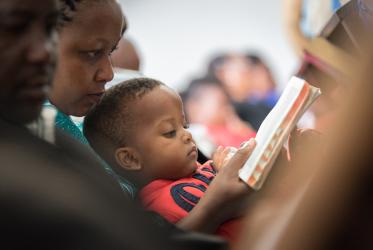*By Kristine Greenaway
What do indigenous peoples expect of churches in light of Canada’s Truth and Reconciliation Commission (TRC) on church-run residential schools for aboriginal children? Dr Marie Wilson, TRC Commissioner, responds in this wide-ranging interview with World Council of Churches (WCC) Communication.
Stories of how children were stripped of their sense of worth were the hardest to hear, Marie Wilson says of her experience as a Commissioner with the TRC.
“What moved me most was the image of children in rows of single cots, growing up with numbers, not names – hungry, alone, sick, abused and angry,” Wilson says. “Yet those children are the heroes of the residential schools story. They refused to be defeated and are now reclaiming their lives and leading Canada.”
For six years, the journalist and educator travelled throughout the country with fellow Commissioners Justice Murray Sinclair and Chief Wilton Littlechild to gather testimony from survivors of government-sponsored, church-run residential schools for aboriginal children. Media coverage of the stories of abuse in the schools gripped the Canadian public.
The Commissioners issued their final report in June. Its 94 recommendations are addressed to the country’s federal and provincial governments and society at large, with many addressed to churches in particular.
“As the one non-Indigenous Commissioner and one raised as a Christian, I have felt as if I wore the face of the perpetrator. As the one female Commissioner, I ached at the forced removal of the little ones and the anguish of their parents,” Wilson confesses. Her husband is a residential school survivor.
The Canadian government established residential schools in the 19th century in order to enact its policy of assimilating aboriginal people into mainstream society. This meant taking children from their families and sending them to residential schools where they were systematically and intentionally stripped of their language and culture. The policy was rooted in the belief that the country’s First Nations were “uncivilized” and “Godless” and was driven by the need for access to the natural resources on aboriginal lands that were required to fuel the growth of urban centres.
“Aboriginal communities were obstacles to resource development and had to be removed. Children had to be changed into something else,” Wilson says. About 150,000 Indigenous children were sent to residential schools between 1883 and 1996 when the last school closed.
The TRC was mandated to gather testimony from former students concerning their residential schools experiences, which for many included abuse, denigration and deprivation. Commissioners heard as well from survivors’ families and communities. The intent was to make Canadians aware of what happened in the schools and the impact it has had on former students and people around them, and on the country as a whole. All told, 15,000 children participated in activities related to the TRC.
The meaning for the church
Now that the Commissioners have issued their recommendations, referred to as Calls To Action, the work of reconciliation can really begin, Wilson says. She has definite ideas of what that means for the church.
“It is important that people understand that children were told their spiritual practices were wrong and that their God-given identity was wrong. It now falls to churches to say that what we did was wrong. Survivors are waiting for this. They need to hear us acknowledge that the Creator speaks many languages,” says this Commissioner who is active in her own local Christian congregation.
Noting the effort and money put into destroying language, culture and spiritual practice, Wilson says the Commission is calling on churches to invest as much in reclamation of what was lost. While she acknowledges that churches can’t solve the problems alone, she believes they must contribute as they participated in creating the problems. This will mean, for example, funding language and culture programmes.
The key to the successful implementation of the Commission’s Calls to Action, Wilson says, lies in the creation of the proposed National Council for Reconciliation that would act as “the keeper of the spirit of the TRC”.
As Canada is in the midst of a federal election campaign, Wilson knows the moment is right for Canadians – including church people – to press for this watchdog organization that would hold Canada accountable by annually measuring and publicly reporting on “the right things” such as the gaps between Indigenous and non-Indigenous Canadians in critical areas like educational achievement, employment, income, mortality, suicide and language vitality.
“Church people carry a lot of influence. We need to live out our social justice values. Sharing, equality and voice: these are spiritual values,” says Wilson. “I vow always to remember and never stop talking about the children. I am ‘an ancestor of tomorrow’. I will continue to carry the stories.”
This interview is the first in a three-part series of news articles featuring answers from a TRC Commissioner, the National Chief of the Assembly of First Nations, and a leading Indigenous Elder from The United Church of Canada.
* Kristine Greenaway is a former WCC communication director with extensive experience in covering stories about global and local ecumenism.








